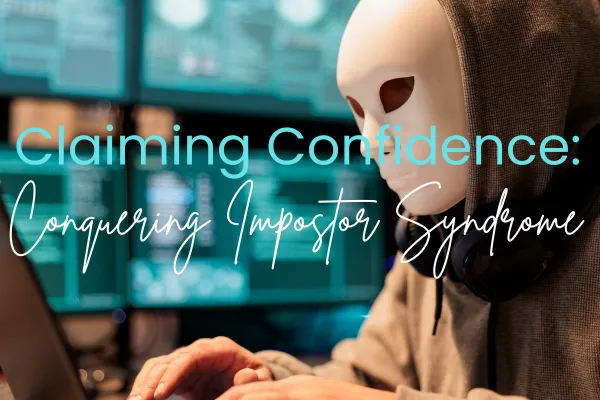Claiming Confidence: Conquering Impostor Syndrome
Victoria Canham • 24 April 2024 • 7 min read

Last week we talked about self-sabotage and how it can hold you back and prevent you from taking action, nevermind performing at your peak. This week I want to talk about its very close cousin, ‘Impostor Syndrome’.
Is Impostor Syndrome Real?
There has been some debate lately about whether or not ‘Impostor Syndrome’ even exists or if it is just a made up concept, but the psychiatric community seem to agree that impostorism exists, particularly since so many people report experiencing it. Is it, as a feeling and experience, real? Yes. Is it a mental health disorder or illness? No. It is a natural part of life. You can experience it, there’s no need to suffer from it. It’s not an official mental health diagnosis according to the World Health Organisation's International Classification of Diseases (ICD) and the Diagnostic and Statistical Manual of Mental Disorders (DSM).
If Impostor Syndrome Is Not a Diagnosis, What Is It Then?
It is intellectual self-doubt.
“The signs and symptoms are feelings of phoniness, self-doubt, and inability to take credit for one’s accomplishments. It is a form of intellectual self-doubt. Those with impostor syndrome are often intelligent and high achievers – like many academics, pharmacists, and professional students.”
~ Persky PhD, AM. Intellectual Self-doubt and How to Get Out of It, Chapel Hill, NC : American Journal of Pharmaceutical Education, 2018
Men and women can experience “Impostor Syndrome”, however it is more prevalent in women than men.
A common time for impostor syndrome to appear is when you go off to Uni for the first time, or when you change careers or you get a promotion to a new role and everything is new, unfamiliar and perhaps a little scary.
It’s the big fish in a small pond to small fish in a big pond analogy. Things are new and different and you’re just not that sure you belong. (Side note: You do)
It is pervasive. It is wretched. And it usually rears its ugly head as soon as you achieve something enormous, and comes back to taunt you if that big thing doesn’t work out with messages like “I told you so”.
You may be experiencing impostor syndrome if:
- You often think: “who am I fooling by being here”
• “I’m not really that bright, I can’t even get my head around this concept”
• “I’m not able to do this”
• “Im such a fraud, it won’t be long until they fire me”
• “They are going to catch me out” as though you’re some of deep cover agent for the FBI
- You worry you’ll be fired if you make even the tiniest mistakes at your work
- You brush off praise for your good work or give the credit to other people
- You just can’t accept feedback, even when it’s constructive.
- Write off your successes, intelligence or expertise, as a fluke, even in areas where you know you are highly skilled
- You doubt your abilities, despite high praise and qualifications, knowledge and experience.
Are there sometimes other biases that may count against you, or make you feel like you don’t belong? Of course, but that doesn’t make you an impostor.
I Think I Have Impostor Syndrome
Oh my friend, welcome to the Club! The membership is vast, distinguished and wide-reaching. Unfortunately, it doesn’t come with any cool swag or perks. Rather, it just leaves you feeling like shit.
Those who don’t admit to having suffered ‘impostor syndrome’ only rank at 18% and some of those 18% will be telling porky pies (lies). They are no more talented or capable or able than you.
Other Triggers for Impostor Syndrome
Some people can trigger impostor syndrome in you. It’s the excessive criticism that derails you.
My brother laughed in my face when I got my first banking job, he said “Haha, you? Banking? Which idiot thought that was a good idea”.
At the time I thought, “maybe he’s right, why did they choose little old me”.
At the time and for quite some time after, it stung and sat badly with me, it made me think that every mistake I made would see me fired. I suffered for too long under the weight of that one, well-timed, sharp tongued comment. As it turns out, the very talented woman who hired me was insanely good, not only at her job, but also at identifying the right talent for the role in a pool of remarkably well educated, impressive talent. And she was one hell of a mentor.
She was also epic at identifying who wouldn’t fit at all within an opening sentence, but that is an aside. I now know that other people’s inability to see your talents, abilities and capabilities is entirely their problem, and probably says more about them than it does about you.
Overcoming Impostor Syndrome
You do not have to live like this. You can overcome impostorism in time, as your confidence grows and you can develop that confidence by:
1. Remember ‘done is better than perfect’-If you are feeling like a fraud, ask yourself if you are also a perfectionist and then reflect on whether or not you are self-sabotaging your efforts and work. Get the work out, it’s likely going for 90 different reviews and iterations before it gets released anyway.
2. Ask for help -You don't need to solve all problems by yourself. Problem-solving with others can promote even more creativity and encourage better relationships.
3. Get a mentor - More senior people at work can give you guidance and share live experience with you, providing more perspective on impostorism, but also on your actual experience in the company from a senior point of view.
4. Reflect - Get out a sheet of paper or your journal and write down your thoughts as they occur and decide if it is the impostor syndrome talking or not. Then address it as needed.
5. Delegate -You don't have to be a superhero and get everything done by yourself. Delegate where you can and showcase your team’s abilities. Managing a capable, competent, high performing team is a great skill to develop and have.
6. Mentor junior team members- Sharing your knowledge and experience has dual benefits in that it will help others develop and grow but also help you affirm your skills to yourself by providing evidence of your achievements, leading to an increase in confidence.
7. Ask for evidence -Schedule regular one-on-one meetings with your manager who can then give you concrete examples of your achievements, as well as areas needing improvement.
8. Hire a Performance Coach- Coaches are there to help you overcome the things that hold you back and to help propel you forward. A performance coach can help you develop strategies to perform better in all areas of your life. Performance Coaching is not just for people who are not doing well at work, it is for people who want to do better and become more.
9. Celebrate -Celebrate small wins, not just major wins. Write down everything you do during the day so that you can celebrate your hard work and efforts as well as results.
10. View mistakes as learning opportunities -This can shift our perspective in a positive way. When we embrace mistakes as chances to grow and improve, we open ourselves up to new insights and experiences. Instead of dwelling on what went wrong, we can focus on what we can learn from the situation and how we can do better next time.
Take Note
Impostorism can lead to burn out. One can try to hide insecurities from bosses and family, but it will start to show up in other areas, like burnout and exhaustion, because of the urge to over prepare, overwork and over deliver.
If you don’t do something about it, it will absolutely destroy your confidence over time.
It’s not a fluke that you have been selected, your experience, your qualifications and hard work today and yes, your personality, have all played a role in your getting to where you are today.
The fact is you are in your role, someone interviewed you and then selected you - what are the facts that support your selection? What progress have you made over the last 5, 10, 15 years?
Stop comparing your whole experience to other people’s highlights. People have different realities and paths.
Get Support
Ready to break free from the grips of Impostor Syndrome and unlock your true potential? Join me on a journey of self-discovery and empowerment in my upcoming 12-week coaching program designed to help you achieve peak performance. As a beta participant, you'll receive exclusive access at 50% off for a limited time.
Send me a message here to learn more and secure your spot today. Don't let self-doubt hold you back any longer – it's time to thrive!
We’re not just about overcoming obstacles, we’re about transforming lives.

Victoria Canham - Mental Performance Coach
Victoria is an ICF-accredited certified professional coach, who offers bespoke performance coach. With a background in change management and countless hours of professional coaching training and experience, I made the big switch to full-time coaching in 2020. I know what it is like to suddenly have the rug pulled out from under you while you're busy making other plans, as a result, I now help people like you to bounce back from adversity and major setbacks to emerge stronger and better than ever before. Our clients have transformed from feeling overwhelmed by life's challenges to confident, goal-driven individuals who navigate life's obstacles with ease. They've achieved their personal and professional objectives and embodied peak performance in all aspects of life. You too can experience this transformation. This is your moment. Your chance to take control, to choose growth over stagnation, achievement over inaction. This is your opportunity to prove to yourself that you're not defined by your challenges—you're defined by how you rise above them. Are you ready to transform your life and achieve peak performance?
FREEBIE

Download the 3 Steps to Discovering Your Life Purpose eBook
© Copyright 2026 Victoria Canham Coaching | Website built by Me on FEA Create (aff.)
Performance Coaching Reading, London, Berkshire, Oxford | St George's Road, Reading, Berkshire, United Kingdom, RG30 2RL | +44 7377 527 529 | [email protected] Open Monday to Friday 9 am until 5 pm


Facebook
Instagram
LinkedIn
Youtube
TikTok